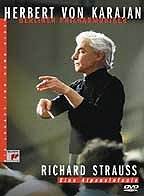This performance was recorded at the Berlin
Philharmonicís annual All Soulsí Day concert. As a DVD it offers
little other than a fairly conventional film of the orchestra
in concert. There are no special features. I also wondered initially
if the opportunity might have been taken to include a discreet
amount of "Alpine footage" Ė after all, this is unashamed
illustrative music. The danger of such an approach is that of
distracting the viewer from the music. However, sensitively employed,
it can enhance the music as was the case in a marvellous film,
broadcast by the BBC some years ago, of Christopher Hogwood conducting
Haydnís Creation, a film which I hope will make it onto
DVD before too long.
Such an approach has not been adopted here, presumably
because this is one of the substantial series of concert films
which Karajan made towards the end of his life to set down his
"legacy" for posterity. It is not without significance
that in the closing credits he is listed as providing "Artistic
Supervision", for which read "pretty full editorial
control", Iíd suggest.
Most certainly heís in full control of the performance
we see here though, not having seen film of him conducting for
some time, I was rather surprised at how little he seems
to do for much of the time. This performance offers an object
lesson in how to control a performance completely whilst maintaining
economy of gesture. Several younger, more "physical"
conductors might learn from this. Perhaps it is significant the
Karajan became much more animated during the ĎSunsetí sequence
(cue point 21) than in the preceding ĎStormí (cue 20). The former
is conducted with big, sweeping, expressive arm movements while
for much of the superficially more exciting Storm sequence Karajan
seems to be doing little more than beating time and giving entries
with often barely perceptible gestures or glances. The interesting
point is that the Storm is still pretty tumultuous but the Sunset
is simply gorgeous, echt Strauss.
I must put my cards on the table and say that
Iíve long felt that Eine Alpensinfonie is somewhat maligned.
Yes, it is programme music, but Strauss was quite open about that.
The thematic material is not as distinguished as that in some
of his other tone poems and, of course, by its very nature itís
an episodic piece. However, the orchestration is tremendously
skilful and Karajanís performance here, assisted by flawless playing
from the BPO, is a sharp reminder of how many passages are delicately
and atmospherically scored. The piece is far from being all bombast,
as some have claimed. Frankly, Iíd far rather listen to this than
the tedious, overblown Also sprach Zarathustra.
That said, of course the piece has its weaknesses.
What it needs is a master Straussian at the helm to make the most
of its many virtues and to save us from being embarrassed by its
less successful elements. Perhaps Iím biased in its favour by
having learned it from the audio recordings of Bernard Haitink
and Rudolf Kempe, great Strauss conductors both. Karajan is another
master of this repertoire and, even at the age of 77, he proves
himself to be an expert mountain guide. I think we also benefit
from his age and from the wisdom of experience. He knows just
how to pace and shape a potentially ramshackle work such as this.
He knows also how to control dynamics so as to avoid the trap
of vulgarity into which a lesser conductor might easily fall.
Instead, he makes us marvel at the resourcefulness with which
Strauss deploys his mammoth orchestra. There is an abundance of
colour and dynamic contrast in Karajanís reading for which the
fabulous Berliners must take their share of the credit, of course.
Itís just a pity that after the Epilogue (cue 22), refulgently
played here, and the concluding descent back into Night (cue 23)
the audience is unable to restrain their applause, thereby vitiating
much of the atmosphere so potently built by the performers.
Artistically, therefore, this DVD is self-recommending.
The visual presentation is that of a pretty conventional concert
relay with plenty of focus on the maestro himself. The disc is
divided into 24 separate cue points, all listed in the booklet
and breaking the work down into its component sections. On my
equipment the sound reproduction was good and Iím sure it will
be even better run through a hi-fi system. The fulsome note adds
little, Iím afraid.
Overall, a good release which offers a high quality
performance and an interesting visual record of Karajan in action.
Recommended
John Quinn

